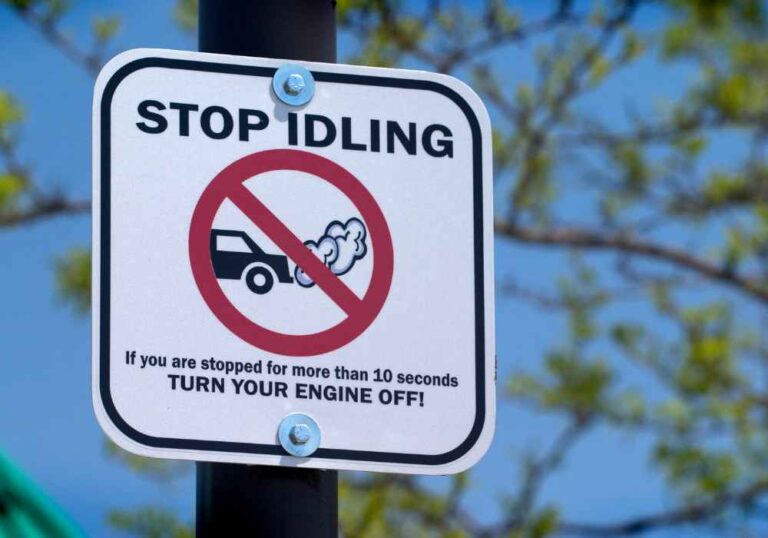Idling is the practise of leaving a car’s engine running while it is stationary. In traffic, drivers are occasionally compelled to idle, but this is not always essential. Drivers can change their habit of idling, especially after learning how detrimental it can be to their health and the environment. The fact that there are millions of vehicles on the road every day is seen by most businesses as a sign of profitability, and in many situations, it is. But what occurs when those cars are just sitting there? Understanding idling time and managing it is an important part of running your fleet because idling immediately affects your bottom line and reduces profitability. The advantages and disadvantages of engine idling are the subject of a significant quantity of conflicting material. The following are the main consequences of engine idling: Idling an engine wastes gasoline (and therefore money). Idling an engine damage its internals, including the piston rings, cylinders, and spark plugs, and can result in a 5% increase in fuel consumption. Idling engines add to air pollution. You could receive a fine for leaving your engine running in several areas of Canada.
Debunking some of the Engine myths due to Idling in a car:
Restarting an engine increases emissions If you start an engine then immediately shut it off and resume it, the pollution it produces is greater than when it is idling. Longer idling would have resulted in greater fuel loss. To charge the battery, you must keep the engine running. Modern batteries don’t require the engine to be running to keep the battery charged. Using the ignition will damage it. Turning the car on and off rather than letting it idle results in less wear and tear with modern ignitions.
Idling period in a car in Canada:
Currently, Canadian bylaws permit automobiles to idle for three to ten minutes in one instance. The duration of the permitted idling time has raised concerns among enforcement personnel in numerous towns since it makes by-law enforcement more time-consuming and expensive the longer an officer must wait and watch an idling vehicle. It would be simpler to implement idling control bylaws with a shorter permitted idle period.
A shorter idle time would also comply with many bylaws’ goals of lowering greenhouse gas emissions. The fuel consumption and greenhouse gas emissions of a light-duty vehicle with a heated engine that idles for longer than 10 seconds are higher than those of an engine that is stopped and started again.
Why do Canadians Idle in a car?
For a combined total of more than 75 million minutes per day, many Canadian drivers leave their cars idle for around eight minutes. Over 1100 automobiles would need over 2.2 million litres of fuel to run for an entire year, or one vehicle would need to be idle for 144 years, to emit over five million kilos of greenhouse gases (GHGs) in only one day!
Why should you avoid Idling?
It’s a financial waste. Gas prices are high and are expected to rise even further once carbon pricing is implemented across Canada.
Depending on the size of your engine, ten minutes of idling in your car uses between a quarter and half a litre of fuel, according to Natural Resources Canada. In addition, idling for 10 seconds consumes more fuel than starting the engine.
Idling in a car is harmful for your health and respiratory functioning. Idling in a car or other vehicles leads to fumes which have are associated with asthma, a general decline in respiratory function, heart illness, and even cancer. As a result, they can cause a range of serious health problems. Simply, they are bad for your lungs.
It causes Environment-related issues. When your idling in a car, you damage the environment in addition to wasting petrol. One pound of carbon dioxide is emitted into the environment for every 10 minutes of idling in a car. Idling harms your engine. As if environmental and general health issues weren’t enough, prolonged idling might shorten the useful life of your engine. When your engine is idling, the fuel doesn’t completely burn off since your engine isn’t running at its highest temperature, leaving residue that could eventually cause damage to your exhaust systems.

Fines and regulations for Idling:
In Toronto, it is technically against the law for people to be Idling in a car for more than one minute in a sixty-minute period. It might cost more than just extra gas money since those who are caught face fines of up to $500.
Similar limitations are in place in a few other significant Canadian cities, including Ottawa and Vancouver.
According to the Idling Control By-law, idling in a car is prohibited for longer than one (1) minute per 60 minutes.
Climate change is exacerbated by vehicle emissions. We are assisting in enhancing Toronto’s air quality by limiting excessive idling in a car to just one minute. It’s one easy way we can all contribute to maintaining clean air.
To enhance air quality, the city also urges residents to think about choosing alternate modes of transportation like walking, cycling, and public transportation to avoid idling in a car.
It is recommended to not Idle in a car when you can avoid it as it burns fuel and damages our environment. Avoid Idling! To know more visit www.hitechdriver.com







